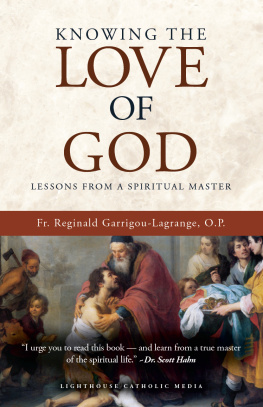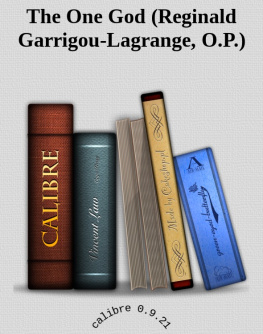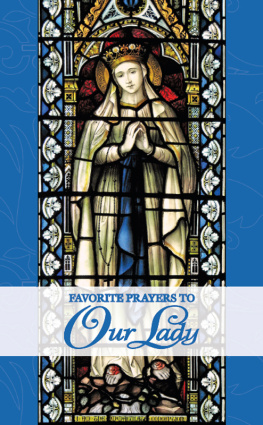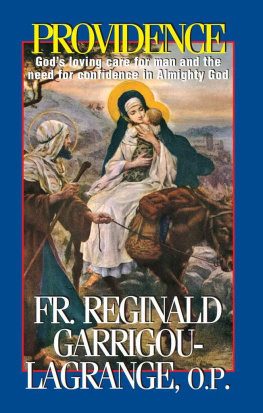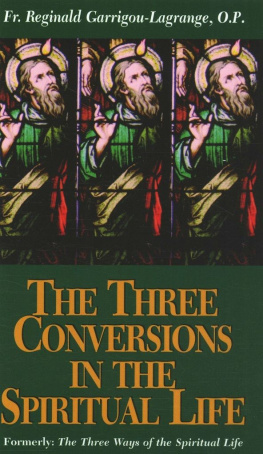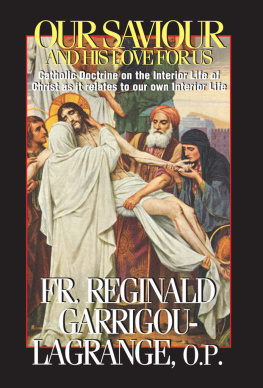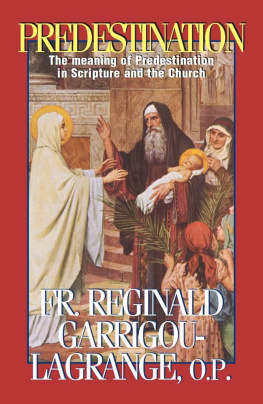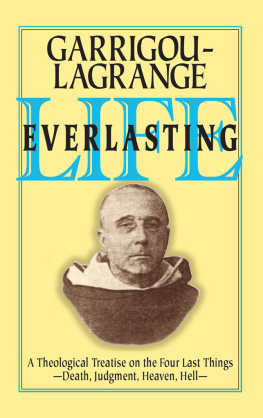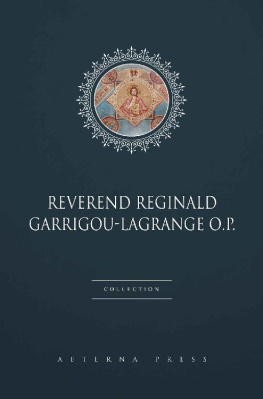Réginald Garrigou-Lagrange - Grace
Here you can read online Réginald Garrigou-Lagrange - Grace full text of the book (entire story) in english for free. Download pdf and epub, get meaning, cover and reviews about this ebook. year: 2010, publisher: Createspace, genre: Science. Description of the work, (preface) as well as reviews are available. Best literature library LitArk.com created for fans of good reading and offers a wide selection of genres:
Romance novel
Science fiction
Adventure
Detective
Science
History
Home and family
Prose
Art
Politics
Computer
Non-fiction
Religion
Business
Children
Humor
Choose a favorite category and find really read worthwhile books. Enjoy immersion in the world of imagination, feel the emotions of the characters or learn something new for yourself, make an fascinating discovery.

- Book:Grace
- Author:
- Publisher:Createspace
- Genre:
- Year:2010
- Rating:3 / 5
- Favourites:Add to favourites
- Your mark:
- 60
- 1
- 2
- 3
- 4
- 5
Grace: summary, description and annotation
We offer to read an annotation, description, summary or preface (depends on what the author of the book "Grace" wrote himself). If you haven't found the necessary information about the book — write in the comments, we will try to find it.
Réginald Garrigou-Lagrange: author's other books
Who wrote Grace? Find out the surname, the name of the author of the book and a list of all author's works by series.
Grace — read online for free the complete book (whole text) full work
Below is the text of the book, divided by pages. System saving the place of the last page read, allows you to conveniently read the book "Grace" online for free, without having to search again every time where you left off. Put a bookmark, and you can go to the page where you finished reading at any time.
Font size:
Interval:
Bookmark:
GRACE
Commentary on the Summa theologica of
St. Thomas, Ia IIae, q. 109-14
REV. REGINALD GARRIGOU-LAGRANGE, O.P.
Translated by
THE DOMINICAN NUNS
Corpus Christi Monastery
Menlo Park, California
Edited by
Paul A. Ber, Sr.
Veritatis Splendor Publications
et cognoscetis veritatem et veritas liberabit vos
NIHIL OBSTAT
lnnocentius Swoboda, O.F.M.
Censor Librorum
IMPRIMATUR
Joseph E. Ritter
Archiepiscopus
St. Ludovici,die 25a mensis, julii, 1952
The contents of Grace by Reginald Garrigou-Lagrange, OP isin the public domain. However, this version is copyrighted.
Copyright 2012.Veritatis Splendor Publications.
ALL RIGHTS RESERVED.
AUTHORS DEDICATION
To the holy Mother ofGod,
Mother of divine Grace,
WHO SWEETLY ANDSUBLIMELY TEACHES TO LITTLE
ONES THE MYSTERIES OF SALVATION,
THE AUTHOR DEDICATES THIS WORK
IN TOKEN OF GRATITUDE AND FILIAL OBEDIENCE
CONTENTS
We have already explained at length in the treatise on theone God the doctrine of St. Thomas about the knowledge and will of God,providence and predestination, and likewise in the treatise on God the Creatorhis doctrine on evil. Now it remains to apply the principles already expoundedto the questions of grace, so that these may be considered in relation to man,and also in relation to God, the author of grace, who is the subject of sacredtheology. Indeed this science considers all things in relation to God, asoptics does in relation to color and light, mathematics in relation to quantity,metaphysics in relation to being as such.
Hence the present treatise On grace depends on the treatiseabout the divine will in which we have already set forth the will for universalsalvation and the distinction between antecedent will and consequent will,which is the ultimate basis, as we shall see, of the distinction betweensufficient grace and efficacious grace.
We presuppose, likewise, St. Thomas doctrine on theintrinsic and infallible efficacy of the divine decrees, presented in Ia, q.19, a. 8, which we have explained at length in the treatise on the one God,refuting the objections based on the violation of freedom, on insufficiency ofhelp, and on affinity with Calvinism.
Our treatise on grace is especially connected with question20, Part I, on the love of God: 1. whether love exists in God; 2. whether Godloves all things; 3. whether God loves all things equally; 4. whether Godalways loves better things more. In explanation of this last article, we showthe value of the principle of predilection: Nothing would be better thananything else (as an act, easy or difficult, natural or supernatural, initialor final) unless it were more loved and sustained by God. What hast thou thatthou hast not received? (I Cor. 4:7.) As we shall see, this principle throws alight from on high upon all questions of predestination and grace. It islikewise the basis of Christian humility and of our gratitude to God, who hathfirst loved us.
At the same time, no less emphasis must be placed on anotherprinciple of St. Augustine, formulated and cited at the Council of Trent(Denz., no. 804): God does not command the impossible, but by commanding Heincites thee to do what thou canst and to ask what thou canst not, and Heassists thee so that thou mayst be able. These two principles taken togetherprevent opposing deviations; preserve balance of thought and the harmony of thedivine word in regard to these most difficult questions.
1. The teaching of the Fatherson grace
Schwane, Histoire des Dogmes, tr. Degert, 1904.
J. Tixeront, Histoire des Dogmes. Vol. I : Thologieanrnicenne, 1905; Vol. 11: S. Athanase S. Augustin, 1909; Vol. III: La finde lge patristique, 1912, p. 274 ff.
Hfele, Histoire des conciles, tr. Leclerq (Paris, 1908),II, 168.
St. Augustine, De natura et gratia; De gratia Christi;Enchiridion; Sex libr. aduersus Julianum; De gratia et libero arbitrio; Decorreptione et gratia; De praedestinatione sanctorum; De dono perseuerantiae.
St. Prosper, PL, LI, 155-276.
St. Fulgentius, De gratia et libero arbitrio.
St. Bernard, De gratia et libero arbitrio.
Peter Lombard, Sent., Bk. II, d. 26-28: De gratia.
St. Bonaventure and St. Albert the Great, In II Sent.
2. Works of St. Thomas and ofThomists on grace
St. Thomas, In II Sent., d. 26-28; la llae, q. 109-14;Contra Gentes, Quaest. disput.
Principal commentators: Capreolus, In II Sent., d. 26;Cajetan, In Iam IIae, q. 109 ff.; Medina, John of St. Thomas.
Sylvius, Gonet, the Salmanticenses, Gotti, Billuart.
Soto, De natura et gratia, 1551.
Thomas Lemos, Panoplia gratiae, 4 vols., 1676.
Alvarez, De auxiliis diuinae gratiae, 1610.
Gonzalez de Albeda, In Iam, q. 19, 1637.
Goudin, De gratia, 1874.
Reginaldus, O.P., De mente Conc. Trident. circa gratiamseipsa efficacem, 1706.
Among recent works by Thomists: Dummermuth: S. Thomas etdoctrina praemotionis physicae, Paris, 1886; Defensio doctrinae S. Thomas,1895. N. Del Prado, O.P.,: De gratia et libero arbitrio, 3 vols., Fribourg(Switzerland), 1907. Garrigou-Lagrange, O.P. La prdestination des saints et lagrce, 1936; Dict. thol. cath., arts., Prdestination, Prmotion.Schaezler: Natur und Gnade, Mainz, 1867.
3. Outside the Thomistic School
Molina, Concordia, Paris, 1876.
Suarez, De gratia.
St. Robert Bellarmine, De controversiis (Prague, 1721), Vol.IV.
St. Alphonsus de Liguori, De modo quo gratia operatur; Demagno orationis medio.
Scheeben, Natur und Gnade, Mainz, 1861. Strongly inclinestoward Thomism.
Billot, S.J., De gratia Christi, 2nd ed., 1921.
Van der Meersch, De divina gratia (Bruges, 1910) and Dict.thol. cath., art., Grce.
J. Ude, Doctrina Capreoli de influxu Dei in actus uoluntatishumanae, Graz, 1905. This author favors Thomism.
Ia IIae, q. 109-114
In the first place something must be said about the positionof this treatise in the Summa theologica. St. Thomas treats of grace in themoral part of his Summa, for, after the questions of human acts themselves,must be considered the principles of human acts; first, the intrinsic principles,namely, good and bad habits, or virtues and vices; secondly, the externalprinciples of human acts, namely, Gods teaching us by means of His law, andHis assistance to us by His grace.
Hence the treatise on grace belongs to the moral part oftheology no less than the treatise on law. Moral theology is not a sciencedistinct from dogmatic theology, since the formal object (objectum formale quodet quo) is ever the same: God under the aspect of His Deity so far as it fallsunder virtual revelation. It would be surprising if the moral part of sacredtheology did not treat of the necessity of grace for doing good conducive tosalvation and of the effects of grace, i.e., justification and merit. Indeed,if moral theology is deprived of these treatises, it will be reduced almost tocasuistry, which is only its lowest application, as asceticism and mysticismare its highest applications.

Among Thomistic commentators the following, along withCajetan, are especially to be read: Soto (De natura et gratia), John of St.Thomas, the Salmanticenses, Gonet, Gotti, Billuart. Cf. also among moderntheologians, Scheeben (Natur und Gnade).
This division of the whole treatise is methodical,corresponding to the division into four causes. 1. Grace is consideredbeginning with the definition of the word and with reference to its necessityfor the end of eternal life and to its existence. 2. Thus, in regard to itsend, grace, as it is the seed of glory, is defined as a participation in thedivine nature and is determined by the subject in which it resides, that is,the essence of the soul. 3. After the definition of grace, its subdivisions aregiven. Then its efficient cause and its effects are discussed. Thus all thosethings which belong to it per se are taken into consideration.
Next pageFont size:
Interval:
Bookmark:
Similar books «Grace»
Look at similar books to Grace. We have selected literature similar in name and meaning in the hope of providing readers with more options to find new, interesting, not yet read works.
Discussion, reviews of the book Grace and just readers' own opinions. Leave your comments, write what you think about the work, its meaning or the main characters. Specify what exactly you liked and what you didn't like, and why you think so.

